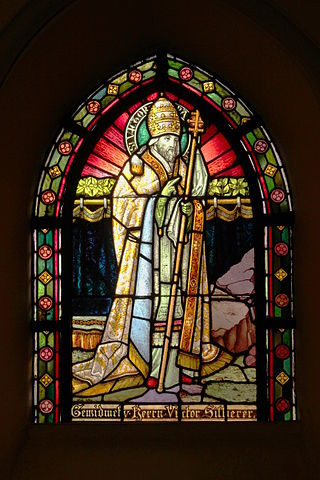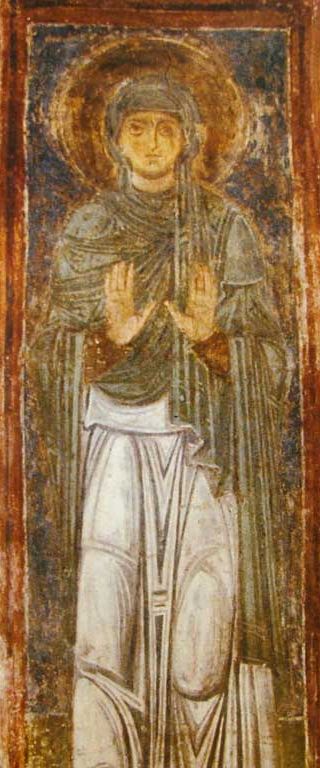
St. Donald of Sheridan, also known as Donivald or Domhnall, was an eighth-century Scottish saint who lived at Ogilvy, in the former Forfarshire.

St. Donald of Sheridan, also known as Donivald or Domhnall, was an eighth-century Scottish saint who lived at Ogilvy, in the former Forfarshire.
Upon the death of his wife, Donald converted his home into a hermitage where he lived a monastic life with his nine daughters (known as the Nine Maidens or the Holy Nine Virgins). Upon his death they entered a monastery in Abernethy. Churches throughout Scotland were dedicated to the Nine Maidens. Their feast day is 15 July. [1] [2]

Pope Victor I was a Roman African prelate of the Catholic Church who served as Bishop of Rome in the late second century. The dates of his tenure are uncertain, but one source states he became pope in 189 and gives the year of his death as 199. He was born in the Roman Province of Africa—probably in Leptis Magna. He was later considered a saint. His feast day is celebrated on 28 July as "St Victor I, Pope and Martyr". He was of Berber origin.

Cuthbert of Lindisfarne was an Anglo-Saxon saint of the early Northumbrian church in the Celtic tradition. He was a monk, bishop and hermit, associated with the monasteries of Melrose and Lindisfarne in the Kingdom of Northumbria, today in north-eastern England and south-eastern Scotland. Both during his life and after his death, he became a popular medieval saint of Northern England, with a cult centred on his tomb at Durham Cathedral. Cuthbert is regarded as the patron saint of Northumbria. His feast days are 20 March and 4 September.

Scholastica was an Italian Christian hermit and the sister of Benedict of Nursia. She is traditionally regarded as the foundress of the Benedictine nuns.

Catherine of Alexandria, also spelled Katherine is, according to tradition, a Christian saint and virgin, who was martyred in the early fourth century at the hands of the emperor Maxentius. According to her hagiography, she was both a princess and a noted scholar who became a Christian around the age of 14, converted hundreds of people to Christianity and was martyred around the age of 18. More than 1,100 years after Catherine's martyrdom, Joan of Arc identified her as one of the saints who appeared to and counselled her.

According to apocrypha, as well as Christian and Islamic tradition, Saint Anne was the mother of Mary, the wife of Joachim and the maternal grandmother of Jesus. Mary's mother is not named in the Bible's canonical gospels. In writing, Anne's name and that of her husband Joachim come only from New Testament apocrypha, of which the Gospel of James seems to be the earliest that mentions them. The mother of Mary is mentioned but not named in the Quran.

Margaret, known as Margaret of Antioch in the West, and as Saint Marina the Great Martyr in the East, is celebrated as a saint on 20 July in Western Christianity, on 30th of July by the Eastern Orthodox Church, and on Epip 23 and Hathor 23 in the Coptic Orthodox Church.

Lucia of Syracuse (283–304), also called Saint Lucia was a Roman Christian martyr who died during the Diocletianic Persecution. She is venerated as a saint in Catholic, Anglican, Lutheran, and Eastern Orthodox Christianity. She is one of eight women explicitly commemorated by Catholics in the Canon of the Mass. Her traditional feast day, known in Europe as Saint Lucy's Day, is observed by Western Christians on 13 December. Lucia of Syracuse was honored in the Middle Ages and remained a well-known saint in early modern England. She is one of the best known virgin martyrs, along with Agatha of Sicily, Agnes of Rome, Cecilia of Rome, and Catherine of Alexandria.

David Beaton was Archbishop of St Andrews and the last Scottish cardinal prior to the Reformation.

Macrina the Younger was an early Christian consecrated virgin. Macrina was elder sister of Basil the Great, Gregory of Nyssa, Naucratius and Peter of Sebaste. Gregory of Nyssa wrote a work entitled Life of Macrina in which he describes her sanctity and asceticism throughout her life. Macrina lived a chaste and humble life, devoting her time to prayer and the spiritual education of her younger brother Peter.

Earl of Airlie is a title of the peerage in Scotland created on 2 April 1639 for James Ogilvy, 7th Lord Ogilvy of Airlie, along with the title "Lord Ogilvy of Alith and Lintrathen". The title "Lord Ogilvy of Airlie" was created on 28 April 1491.
James Robert Bruce Ogilvy is a British landscape designer, and the founder and editor of Luxury Briefing. He is a member of the extended British royal family as the elder child and only son of Princess Alexandra of Kent and Sir Angus Ogilvy. Queen Elizabeth II was a first cousin of his mother, both being granddaughters of King George V. As a result, he is a second cousin of King Charles III and 58th in the line to the British throne.

David George Coke Patrick Ogilvy, 13th Earl of Airlie, was a Scottish landowner, soldier, banker and peer.

Saint Nino was a woman who preached Christianity in the territory of the Kingdom of Iberia, in what is modern-day Georgia. Her preaching resulted in the Christianization of Iberia.
Æbbe, also called Tabbs, was an Anglian abbess and noblewoman. She was the daughter of Æthelfrith, king of Bernicia from c. 593 to 616. She founded monasteries at Ebchester and St Abb's Head near Coldingham in Scotland.

A novena is an ancient tradition of devotional praying in Christianity, consisting of private or public prayers repeated for nine successive days or weeks. The nine days between the Feast of the Ascension and Pentecost, when the disciples gathered in the upper room and devoted themselves to prayer, is often considered to be the first novena.

July 14 - Eastern Orthodox Church calendar - July 16

Clan Ogilvy, also known as Clan Ogilvie, is a Highland Scottish clan. Originating from Angus, Scotland, the progenitor of the Clan received a barony from King William the Lion in 1163. In 1491, King James IV elevated Sir James Ogilvy as Lord Ogilvy of Airlie.

October 12 - Eastern Orthodox liturgical calendar - October 14
Many cultures around the world have stories about groups of nine women. In Great Britain they occur in a variety of situations. In Scotland there are references to Nine Maidens, purportedly a group of, and there were a number of wells dedicated to them, but like all similar groupings would appear to have had their origin in pre-Christian times. In Arthurian material, the best known of these groups are the Nine sorceresses, Morgan and her sisters who live on the Isle of Avalon and are both seeresses and healers. Another group occur in the Welsh tale of Peredur son of Efrawg, and these are the armed witches of Caer Lyow. Also in Welsh mythology, we have nine maidens who tend the fire below the Cauldron of the "Chief of Annwn"; this cauldron is the target of Arthur’s raid on the Underworld in Taliesin’s famous poem Preiddeu Annwfn.

George Wishart (1599–1671) was a Scottish Episcopalian bishop and author.